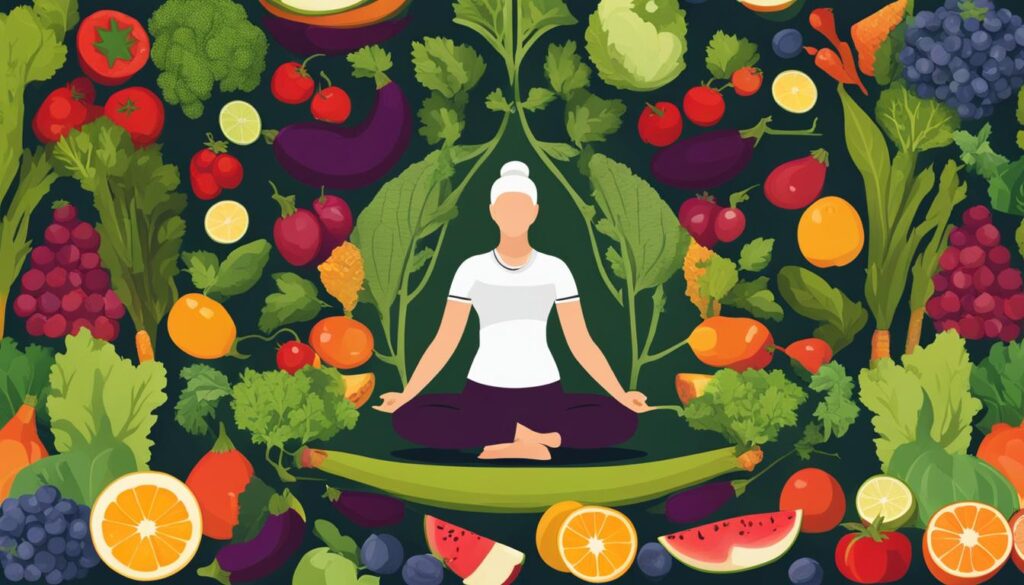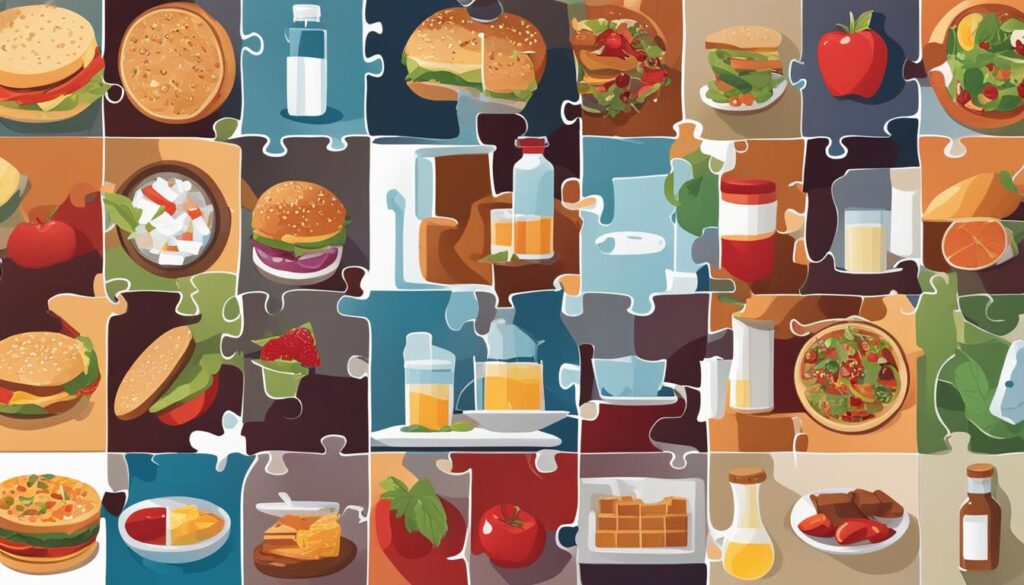If you’re looking to lower your blood pressure and reduce hypertension, natural remedies should be your first line of defense. By making some simple lifestyle changes, you can make a significant impact on your overall health and well-being.
In this article, we’ll explore the best practices for reducing hypertension through a combination of diet, fitness, and mindfulness. We’ll provide you with practical tips and strategies to help you manage your blood pressure and keep your heart healthy.
Key Takeaways:
- Reducing hypertension is possible through natural remedies.
- Diet, fitness, and mindfulness can all help lower blood pressure.
- By incorporating lifestyle changes, you can improve your overall health and wellness.
- Managing hypertension requires sustainable modifications to your daily routine.
- Consult your healthcare provider before making any significant lifestyle changes or starting a new exercise program.
Understanding Hypertension Management
If you have been diagnosed with hypertension or are concerned about high blood pressure, it is essential to understand how to manage this condition. Hypertension management typically involves a combination of lifestyle changes and, in some cases, medication. Making the necessary lifestyle modifications is crucial in preventing hypertension and controlling blood pressure.
Hypertension Prevention
The best way to manage hypertension is by preventing it from occurring in the first place. Some of the most effective ways to reduce your risk of developing high blood pressure include:
- Maintaining a healthy weight
- Limiting alcohol consumption
- Reducing salt and sodium intake
- Introducing exercise into your routine
- Avoiding smoking and exposure to secondhand smoke
Lifestyle Changes for Hypertension
If you have already been diagnosed with hypertension, lifestyle changes are crucial in managing your blood pressure. Some of the most effective lifestyle modifications include:
- Eating a heart-healthy diet, such as the DASH diet
- Limiting caffeine consumption
- Reducing stress through activities such as yoga or meditation
- Maintaining a regular exercise routine
- Getting enough sleep each night
Hypertension Management with Medication
If lifestyle changes are not enough to manage hypertension, medication may be necessary. Your healthcare provider may prescribe medication to help lower your blood pressure. It’s essential to follow your medication plan as prescribed, even if you feel better and your blood pressure levels have normalized.
Note: Never stop taking medication without first consulting with your healthcare provider.

“Hypertension is known as the “silent killer” because it often has no symptoms until it reaches a dangerous level.”
By making the necessary lifestyle changes, including a healthy diet, regular exercise, and stress management techniques, you can prevent hypertension or manage your high blood pressure if you have already been diagnosed. Consult with your healthcare provider to develop a hypertension management plan that works for you.
A Heart-Healthy Diet for Hypertension
Incorporating a heart-healthy diet into your daily routine can significantly reduce hypertension. The Dietary Approaches to Stop Hypertension (DASH) is an effective eating plan that can help you manage high blood pressure. The DASH diet emphasizes fruits, vegetables, whole grains, lean proteins, and low-fat dairy products while limiting sodium, sweets, and saturated fats.
To get started with the DASH diet, focus on incorporating more plants into your meals. Try adding vegetables and fruits to every meal, swapping refined grains for whole grains, and choosing lean proteins such as fish, chicken, and beans. Limit high-fat meats, processed foods, and sugary drinks to reduce your intake of saturated and trans fats, added sugars, and sodium.
Here’s a breakdown to give you an idea of what a DASH-approved daily meal plan could look like:
| Meal | Food Group |
|---|---|
| Breakfast |
|
| Lunch |
|
| Dinner |
|
Remember, a heart-healthy diet doesn’t have to be boring. Experiment with herbs and spices to add flavor to your meals, and try new recipes featuring your favorite foods.
While the DASH diet is a great starting point, it’s important to customize your diet based on your individual needs and preferences. Consult with a registered dietitian to create a personalized hypertension diet that works for you.

Exercise and its Impact on Blood Pressure
Regular exercise is crucial for managing high blood pressure. Physical activity helps to lower blood pressure by strengthening your heart, reducing the force on your arteries, and improving blood flow throughout your body.
To get the most significant benefits, aim for at least 30 minutes of moderate-intensity aerobic exercise most days of the week. Walking, cycling, swimming, and dancing are all excellent options. If you are new to exercise, start slowly and gradually build up your intensity.
The Best Exercises for Hypertension
While any physical activity is beneficial, some exercises are particularly effective for lowering blood pressure. Cardiovascular exercises that get your heart pumping, such as running, cycling, and swimming, are ideal.
Strength training exercises that focus on large muscle groups, such as the legs and arms, can also help to lower blood pressure. Resistance bands, weights, and bodyweight exercises, such as squats, push-ups, and lunges, are all effective options.
Cardiovascular Health Improvement
Exercise is not only helpful for lowering blood pressure, but it also has numerous other benefits for cardiovascular health. Regular physical activity can help to reduce your risk of heart disease and stroke, boost circulation, and improve cholesterol levels.

“Physical activity is a terrific anti-hypertensive therapy. It rivals or surpasses medication in its ability to reduce hypertension.”
Tips for Incorporating Exercise into Your Routine
- Schedule exercise into your day, just like any other appointment.
- Find a workout buddy or join a fitness class for motivation.
- Make it enjoyable by choosing activities that you enjoy.
- Mix it up with a variety of exercises to keep things interesting.
By incorporating regular exercise into your routine, you can significantly reduce your blood pressure and improve your overall health and well-being. Start slowly and gradually increase your intensity to find a workout routine that works for you.
The Role of Mindfulness in Hypertension Control
When it comes to managing hypertension, stress management techniques are just as important as diet and exercise. The link between stress and hypertension is well-established, and reducing stress levels can have a significant impact on controlling blood pressure.
Mindfulness is a technique that involves focusing your attention on the present moment, allowing you to become more aware of your thoughts and emotions without judgment. By practicing mindfulness, you can learn to let go of stress and anxiety, ultimately reducing your blood pressure.
Research has shown that mindfulness-based interventions can lead to significant reductions in blood pressure and overall stress levels. One study found that participants who practiced mindfulness meditation for 8 weeks showed a significant decrease in both systolic and diastolic blood pressure readings.
In addition to meditation, there are other alternative treatments that may help reduce hypertension. Relaxation techniques, such as deep breathing exercises, progressive muscle relaxation, and guided imagery, can also be effective in reducing stress and lowering blood pressure.
“Mindfulness-based interventions can lead to significant reductions in blood pressure and overall stress levels.”

If you’re new to mindfulness and relaxation techniques, there are plenty of resources available to help you get started. Consider attending a meditation class, downloading a guided meditation app, or practicing deep breathing exercises on your own.
By incorporating mindfulness and relaxation techniques into your daily routine, you can lower your stress levels, reduce hypertension, and improve your overall well-being.
Effective Antihypertensive Lifestyle Tips
Lowering high blood pressure requires a dedicated effort to adopt a healthier lifestyle. Making subtle changes to your daily routines, eating habits, and exercise routine can make a significant impact on your blood pressure levels. Here are some effective antihypertensive lifestyle tips you can incorporate into your daily life:
Dietary modifications:
A healthy diet is essential for reducing high blood pressure. Reducing salt intake, eating more fruits and vegetables, and cutting back on processed foods are simple dietary changes that can have a significant impact on your blood pressure levels. Consider following the Dietary Approaches to Stop Hypertension (DASH) diet, which emphasizes whole grains, lean proteins, and low-fat dairy products.
Exercise:
Regular physical activity is crucial for keeping your blood pressure under control. Aim for at least 30 minutes of moderate-intensity exercise most days of the week. This can include brisk walking, cycling, or swimming. Consult your doctor before starting any exercise routine.
Weight management:
Excess weight puts strain on your heart and increases your risk of developing high blood pressure. Losing weight through a combination of diet and exercise can help reduce your blood pressure levels.
Reduce alcohol intake:
Drinking alcohol in moderation has been shown to have some health benefits, but excessive alcohol consumption can raise your blood pressure levels. Keep your alcohol intake to within recommended limits. For men, this means having no more than two drinks per day, and for women, no more than one drink per day.
Mindfulness practices:
Stress and anxiety can raise your blood pressure levels. Incorporating mindfulness practices like meditation, deep breathing, and yoga into your daily routine can help reduce stress and improve your overall well-being.
Quit smoking:
Smoking is a significant risk factor for high blood pressure and heart disease. Quitting smoking can have a significant impact on your blood pressure levels and overall health.
By incorporating these antihypertensive lifestyle tips into your daily routine, you can naturally reduce your blood pressure levels and improve your cardiovascular health.

Understanding Hypertension Treatments
There are several effective hypertension treatments available that can help you manage your high blood pressure. Depending on your individual situation, your doctor may recommend medication, lifestyle changes, or a combination of both.
Medication for Hypertension
There are several types of medication for hypertension, each working in different ways to lower blood pressure. These include:
| Type of Medication | How It Works | Examples |
|---|---|---|
| Diuretics | Increases urination to remove excess fluid and salt from the body, reducing blood volume and pressure. | Hydrochlorothiazide, Furosemide |
| Beta-Blockers | Slows the heart rate and reduces the force of contractions, lowering blood pressure. | Atenolol, Metoprolol |
| ACE Inhibitors | Blocks the production of angiotensin II, a hormone that constricts blood vessels and increases blood pressure. | Lisinopril, Ramipril |
| Calcium Channel Blockers | Relaxes blood vessels and slows the heart rate to reduce blood pressure. | Amlodipine, Diltiazem |
| Angiotensin Receptor Blockers (ARBs) | Blocks the action of angiotensin II, a hormone that constricts blood vessels and increases blood pressure. | Losartan, Valsartan |
It is important to follow your doctor’s instructions when taking medication for hypertension, and to report any side effects or concerns you may have.
Lifestyle Changes for Hypertension
Lifestyle changes can be an effective way to manage hypertension, and may even allow you to reduce or eliminate the need for medication. Some lifestyle changes that can help lower blood pressure include:
- Following a heart-healthy diet
- Reducing sodium intake
- Increasing physical activity
- Losing weight
- Limiting alcohol consumption
- Quitting smoking
By making sustainable lifestyle changes, you can help control your blood pressure and improve your overall health.
Hypertension Awareness and Education
Another important aspect of hypertension management is awareness and education. By learning more about hypertension, its risk factors, and how to manage it, you can make informed decisions and take an active role in your health. Some ways to increase your awareness of hypertension include:
- Attending educational events or seminars
- Reading up on the latest research and guidelines
- Participating in online support groups or forums
- Talking to your healthcare provider about your concerns
By staying informed and educated about hypertension, you can take steps to manage it effectively and reduce your risk of complications.

Identifying Hypertension Risk Factors
Understanding hypertension risk factors is crucial for preventing and managing high blood pressure. By identifying the factors that increase your risk, you can take proactive measures to reduce your chances of developing hypertension.
Age
As you age, your risk of developing hypertension increases. This is because blood vessels become less flexible over time, making it harder for blood to flow through them.
Family History
If hypertension runs in your family, you are more likely to develop it yourself. This is because genetics play a role in regulating blood pressure.
Race
Some races, such as African Americans, are at a higher risk of developing hypertension. This is because they are more likely to have a genetic predisposition to the condition.
Obesity
Being overweight or obese can significantly increase your risk of developing hypertension. This is because excess weight puts additional strain on your heart and blood vessels.
Sedentary Lifestyle
Lack of physical activity can lead to hypertension. Exercise helps regulate blood pressure and improve cardiovascular health.
Diet
A diet high in salt, saturated fat, and processed foods can increase your risk of developing hypertension. In contrast, a diet rich in fruits, vegetables, and whole grains can help lower your risk.
Smoking
Smoking damages blood vessels and restricts blood flow, which can lead to hypertension. Quitting smoking can significantly reduce your risk.
Stress
Chronic stress can contribute to hypertension by increasing your heart rate and constricting blood vessels. Finding healthy ways to manage stress, such as meditation or deep breathing, can help lower your risk.
Alcohol Consumption
Drinking too much alcohol can raise blood pressure. To reduce your risk, limit alcohol consumption to moderate levels or less.

Conclusion
Congratulations! Now that you have learned about the importance of hypertension management, you can take steps to control your blood pressure and maintain healthy heart practices.
Remember, reducing hypertension requires a combination of diet, fitness, and mindfulness. By making sustainable lifestyle changes, such as incorporating more fruits and vegetables into your diet, engaging in regular physical activity, and practicing stress-management techniques, you can effectively reduce your blood pressure and improve your overall health.
Take Action for Hypertension Control
Here are some actionable steps you can take to control your hypertension:
- Monitor your blood pressure regularly and record your readings
- Make healthy dietary changes, such as reducing your salt intake and following a heart-healthy diet like the DASH diet
- Engage in regular physical activity, such as brisk walking, cycling, or swimming
- Practice stress-management techniques, such as deep breathing and meditation
- Avoid smoking and limit your alcohol intake
- Take medication as prescribed by your healthcare provider
Remember, hypertension is a serious condition that, if left untreated, can lead to heart disease, stroke, and other health complications. By taking steps to control your blood pressure, you are taking an important step towards a healthier, happier life.
Thank you for reading!
FAQ
What is hypertension?
Hypertension, also known as high blood pressure, is a condition in which the force of blood against the artery walls is consistently too high. It is a common and serious health issue that can increase the risk of heart disease, stroke, and other complications.
How can I reduce hypertension?
You can reduce hypertension through a combination of diet, fitness, and mindfulness. Making lifestyle changes, such as adopting a heart-healthy diet, engaging in regular physical activity, and managing stress, can help lower your blood pressure naturally.
What is the DASH diet?
The DASH (Dietary Approaches to Stop Hypertension) diet is an eating plan that focuses on increasing your intake of fruits, vegetables, whole grains, lean proteins, and low-fat dairy products while reducing sodium, saturated fats, and added sugars. It has been shown to effectively lower blood pressure.
Which exercises are best for hypertension?
Exercises that improve cardiovascular health, such as brisk walking, cycling, swimming, and aerobic workouts, are particularly beneficial for hypertension. Aim for at least 150 minutes of moderate-intensity exercise or 75 minutes of vigorous-intensity exercise per week.
How does stress affect blood pressure?
Stress can temporarily raise your blood pressure, and chronic stress can contribute to hypertension. Employing stress management techniques, such as meditation, deep breathing exercises, and relaxation techniques, can help lower blood pressure and improve overall well-being.
What are some natural ways to reduce hypertension?
In addition to dietary modifications and exercise, there are several other lifestyle changes you can make to reduce hypertension. These include avoiding excessive alcohol consumption, quitting smoking, managing weight, reducing sodium intake, and getting enough quality sleep.
What are the treatment options for hypertension?
Treatment options for hypertension include medication prescribed by a healthcare professional, lifestyle changes, and a combination of both. It is important to work closely with your healthcare provider to develop a treatment plan that suits your individual needs.
What are the risk factors for hypertension?
Risk factors for hypertension include family history, age, being overweight or obese, a sedentary lifestyle, a diet high in sodium and low in potassium, smoking, excessive alcohol consumption, and certain medical conditions such as diabetes and kidney disease.
What are the key takeaways for blood pressure control?
The key takeaways for blood pressure control include making sustainable lifestyle changes such as adopting a heart-healthy diet, engaging in regular physical activity, managing stress, and following your healthcare provider’s recommendations. Maintaining healthy habits can lead to better blood pressure management and a healthier heart.


